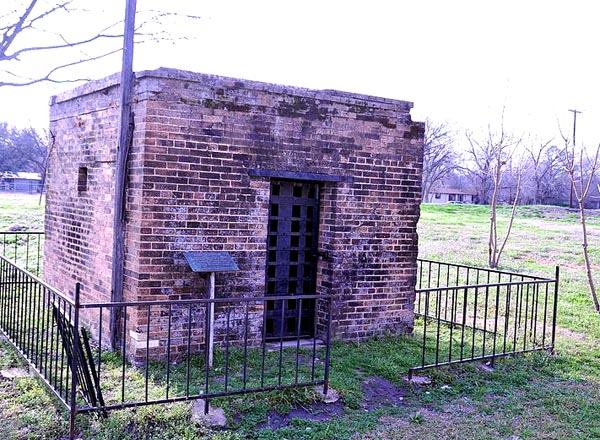 |
| An old calaboose in Texas (Wikipedia) |
Note: If you get all balled up and come a cropper, this lesson on cowboy slang will help you directly. Learn seven more terms besides these!
Get Ready: What's the smallest town you've ever visited? How would you describe the kind of people that lived there?
Way back in Lesson #01-069, I shared with you a few idioms used by cowboys in America's "Old West." I had so much fun with those that I've decided to do several more lessons on the same topic!
Remember, some of these expressions are rare, while others are part of our everyday speech. By the way, some of the ones I've given here may not have originated with cowboys, but sound like the way they talk.
I've given you the meaning and an example of the usage.
back down: yield; give up. When two cowboys faced each other to fight, one of them might decide to quit; he, then, "backed down." "We've put in our bid and we have to follow through; we can't back down now."
balled up: confused; disorganized. Perhaps from when a rope was tangled up into a ball, instead of coiled properly. "The project has gotten all balled up; we need to straighten it out and start again."
beef: complain (verb) or complaint (noun). So, "What are you beefing about?" or "What's your beef?" How does the name of a meat equal the act of complaining? It's said that cattle being driven on the trail complained (lowed, or mooed) constantly, and the term became popular since they were about to become "beef."
bender: drinking session. Perhaps associated with "bending the elbow"=drinking. "The so-called conference we attended was little more than a four-day bender."
blowhard: braggart; bully. Perhaps because one who brags a lot "blows" a lot of air. "Don't worry about Bob's threats; he's kind of a blowhard, but he's harmless."
burg: town. Usually we find this word in combining forms, like Harrisburg or Kingsburg. But in cowboy slang it stands alone. "Now get out there and sell our product in every city, burg, and village!"
calaboose or hoosegow: jail. OK, I honestly can't imagine you using these, but you might hear them from time to time. The first comes from a Spanish word calabozo, meaning "dungeon," and the second, also Spanish, comes from juzgar, "to judge."
chisel: to cheat; swindle. One who does this is a "chiseler." In the old days coins were made of precious metals, and an unscrupulous person might shave (or chisel) bits of this metal off of coins. "Be careful of those guys at ABC Company; they've chiseled us before."
come a cropper: to fail. It originally meant to fall hard off of a horse (the reason, though, is not clear). Now it means to fail completely: "Our new campaign has come a cropper; we're going to have to start over."
directly: soon; immediately. "We expect the new product to improve our bottom line directly."
More "Cowboy Talk" in Lesson #01-107 and #01-108!
--------Read more: https://en.wikipedia.org/wiki/Cowboy
Practice: Use one of the above terms in each of the following sentences. Be sure to use the correct form (for example, plural or past tense).
- My boss is always yelling, but no one really listens. He's such a __________!
- It's hard to reach Charlie by phone when he goes on a __________.
- Please wait; someone will help you __________.
- Once you've signed a contract, it's almost impossible to __________.
- If we don't give this project all we've got, it might __________.
- My records are __________, and I can't figure out who I've called and who I haven't.
- During our trip, we stayed in a quiet little __________ where not much was happening.
- If you have a __________ you'll have to take it up with the management.
- If someone __________ you, don't do business with them again!
- Good guys go to the winner's circle; bad guys go to the __________.
Answers are in the first comment below.
Submitted to the Shenzhen Daily for May 12, 2008
This lesson received 205 visits on my old site between March, 2012, and July, 2021.


Answers to the Practice: 1. e; 2. d; 3. j; 4. a; 5. i; 6. b; 7. f; 8. c; 9. h (chisels); 10. g
ReplyDelete